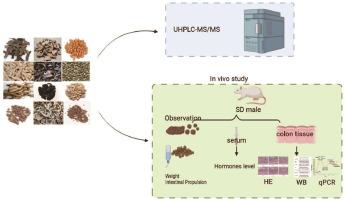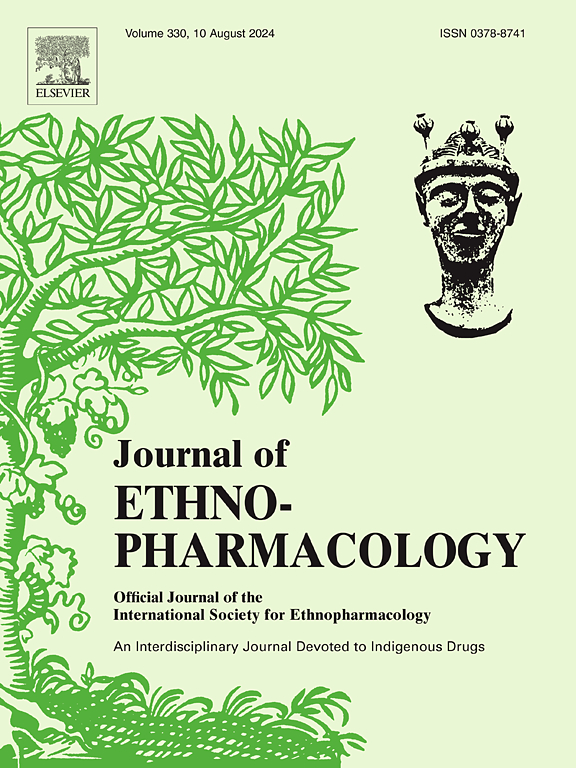通便煎剂通过PI3K/Akt/mTOR信号通路抑制细胞自噬以治疗便秘大鼠
IF 4.8
2区 医学
Q1 CHEMISTRY, MEDICINAL
引用次数: 0
摘要
民族药理学意义:通便煎(Tongbian Decoction,TBD)是一种传统的中国植物药制剂,据报道可改善患者的便秘状况。由于缺乏对 TBD 作用机制的充分了解,我们研究了 TBD 通过磷脂酰肌醇 3- 激酶/蛋白激酶 B/哺乳动物雷帕霉素(PI3K/Akt/mTOR)信号通路对与便秘相关的细胞自噬的影响:研究目的:确定TBD激活PI3K/AKT/mTOR信号通路抑制大鼠自噬的作用机制:本研究中,我们用含复合二苯氧胺 8 毫克/千克/天的饲料喂养大鼠 120 天,以完成便秘大鼠模型的建立。随后,给所有TBD组(TBD-低组、TBD-中组、TBD-高组)的便秘大鼠灌胃不同剂量的药物(TBD-L,1.3g/mL;TBD-M,2.7g/mL;TBD-H,5.3g/mL),持续28天,观察大鼠的一般状况、粪便水分百分比、肠道推进力和病理形态。此外,还采用酶联免疫吸附法检测了神经肽和胃肠激素,并利用Western印迹法和qPCR法检测了蛋白1A/1B-轻链3(LC3)-II/I、Beclin1、p62和PI3K/AKT/mTOR:ELISA表明,TBD能调节胃肠激素水平,增加5-羟色胺(5-HT)、P物质(SP),减少神经肽Y(NPY)、降钙素基因相关肽(CGRP)的形态。同时,TBD还能降低结肠组织中Beclin 1水平和LC3Ⅱ/I比值,升高抑制细胞自噬的p62水平,增加p-PI3/PI3K、p-AKT/AKT和p-mTOR/mTOR的磷酸化水平:这些结果发现,TBD 可调节神经肽和胃肠激素的表达,从而激活 PI3K/AKT/mTOR 信号通路,抑制细胞自噬,增强肠道传导功能。本文章由计算机程序翻译,如有差异,请以英文原文为准。

Tongbian decoction inhibits cell autophagy via PI3K/Akt/mTOR signaling pathway to treat constipation rats
Ethnopharmacological relevance
Tongbian Decoction (TBD) is a traditional Chinese botanical drug preparation which has been reported to improve constipation in patients. Due to the lack of a well-understood action mechanism of TBD, we examined the effects of TBD in cell autophagy via phosphatidylinositol 3-kinase/protein kinase B/mammalian aimed of rapamycin (PI3K/Akt/mTOR) signaling pathway associated with constipation.
Aim of This Study
To determine the mechanism which underlined the effects of TBD for activating PI3K/Akt/mTOR signaling pathway to inhibit the autophagy in rat.
Methods
In this study, we fed the rat with forage containing compound diphenoxylate 8 mg/kg/day for 120 days, to finish the establishment of a constipation rat model. Subsequently, The constipation rats from all TBD group (TBD-Low group, TBD-Medium group, TBD-High group) were intragastrically administered with different dose (TBD-L, 1.3 g/mL; TBD-M, 2.7 g/mL; TBD-H, 5.3 g/mL) for 28 days, and their general condition, fecal moisture percentage, intestinal propulsion and pathological morphology were observed. In addition, Neuropeptid and Gastrointestinal hormones were detected by ELISA, and the inspection of protein 1A/1B-light chain 3 (LC3) -II/I, Beclin1, p62, and PI3K/Akt/mTOR was done with the utility of western blotting and qPCR.
Results
In this study, TBD was shown to be able to improve general condition, intestinal function, and reduce inflammatory cell infiltration, whereas ELISA indicated that TBD can regulate the levels of gastrointestinal hormones, increase5-hydroxytryptamine (5-HT), substance P (SP) and decrease neuropeptide Y(NPY), calcitonin gene related peptide(CGRP) morphology. Meanwhile, TBD can also decrease Beclin 1 level and LC3II/I ratio, and increase p62 level, which inhibit the cell autophagy, and increase the phosphorylation level of p-PI3/PI3K, p-Akt/Akt and p-mTOR/mTOR in colon tissue.
Conclusion
These results found that TBD can regulate the expression of Neuropeptid and Gastrointestinal hormones to activate PI3K/Akt/mTOR signaling pathway, and inhibit the cell autophagy to enhance the function of intestinal transmission.
求助全文
通过发布文献求助,成功后即可免费获取论文全文。
去求助
来源期刊

Journal of ethnopharmacology
医学-全科医学与补充医学
CiteScore
10.30
自引率
5.60%
发文量
967
审稿时长
77 days
期刊介绍:
The Journal of Ethnopharmacology is dedicated to the exchange of information and understandings about people''s use of plants, fungi, animals, microorganisms and minerals and their biological and pharmacological effects based on the principles established through international conventions. Early people confronted with illness and disease, discovered a wealth of useful therapeutic agents in the plant and animal kingdoms. The empirical knowledge of these medicinal substances and their toxic potential was passed on by oral tradition and sometimes recorded in herbals and other texts on materia medica. Many valuable drugs of today (e.g., atropine, ephedrine, tubocurarine, digoxin, reserpine) came into use through the study of indigenous remedies. Chemists continue to use plant-derived drugs (e.g., morphine, taxol, physostigmine, quinidine, emetine) as prototypes in their attempts to develop more effective and less toxic medicinals.
 求助内容:
求助内容: 应助结果提醒方式:
应助结果提醒方式:


